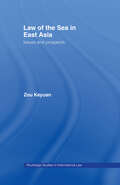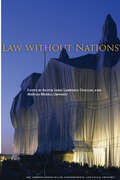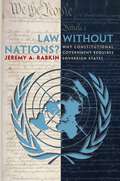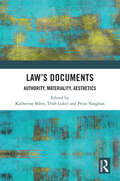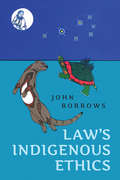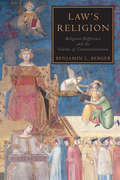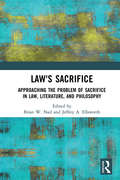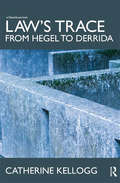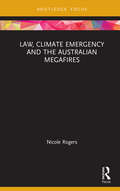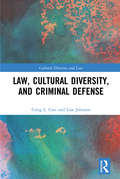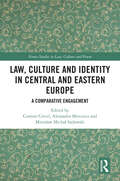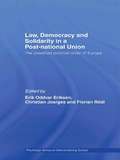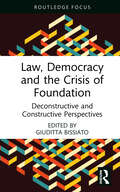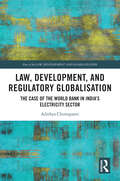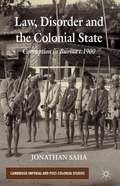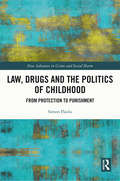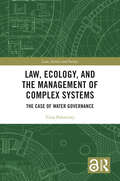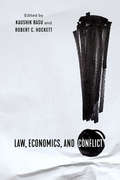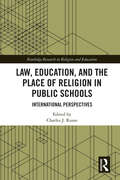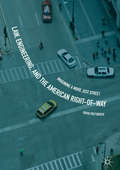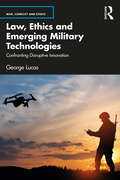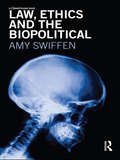- Table View
- List View
Law of the Sea in East Asia: Issues and Prospects (Routledge Studies in International Law #5)
by Keyuan ZouLaw of the Sea in East Asia selects the most prominent maritime legal issues that have emerged since the post-LOS Convention era for a detailed discussion and assessment. The current marine legal order in East Asia is based on the 1982 United Nations Convention on the Law of the Sea (LOS Convention) and accordingly coastal states in the region are obliged to cooperate amongst themselves to exercise their rights and perform their duties. Keyuan, a respected expert in the fields of international and Chinese law, explores issues concerning compliance with the law of the sea, territorial disputes and maritime boundary delimitation, fishery management, safety of navigation and maritime security, and neglected issues in the law of the sea. This is the first book to examine maritime laws in East Asia, and as such will appeal to academics of law and Asian studies, lawyers and policy makers.
Law without Nations
by Austin Sarat Lawrence Douglas Martha UmphreyAs the editors (all of Amherst College) explain in their introduction, how one conceptualizes the idea of "law without nations" depends very much on how one theorizes "the nation." A Hobbesian view of the nation as the state suggests that there can be no such thing as "law without nations." The development of doctrines of international crimes such as genocide suggests that law can exist above and beyond the nation, however defined. Understanding "the nation" either in the sense of the German concept of "das Volk" or as an expression of social solidarity (without, necessarily, the exclusivist connotations of "das Volk") can lead to an understanding of the law as embodying and expressing "matters of tradition, affect, belief, and ultimate values," and thus "law without nations" suggests either an impossibility or the imposition of artificial legality from the outside. Finally, in liberal legality, which sees law as the creator of social solidarity and the vehicle for promoting social justice, "law without nations" can be understood as the culmination of the liberal ideal. It is the tensions between these different ways of understanding "law without nations" that animate the six essays presented here, which explore such specific topics as the legal relationship between the nation-state and a globalized world as pertaining to the punishment of crime and the waging of war; issues of comparative constitutionalism (the US Supreme Court citing decisions of foreign domestic national courts, for instance); the conceptual development of Jewish law in the absence of a state for the nation; the recent development of Islamic Sharia Law as a form of supranational legality arising out of the void of failing states; international law as a facilitator of ethnic displacement and exclusion; and law within a liberal multinational empire. Annotation ©2011 Book News, Inc., Portland, OR (booknews.com)
Law without Nations?: Why Constitutional Government Requires Sovereign States
by Jeremy A. RabkinWhat authority does international law really have for the United States? When and to what extent should the United States participate in the international legal system? This forcefully argued book by legal scholar Jeremy Rabkin provides an insightful new look at this important and much-debated question. Americans have long asked whether the United States should join forces with institutions such as the International Criminal Court and sign on to agreements like the Kyoto Protocol. Rabkin argues that the value of international agreements in such circumstances must be weighed against the threat they pose to liberties protected by strong national authority and institutions. He maintains that the protection of these liberties could be fatally weakened if we go too far in ceding authority to international institutions that might not be zealous in protecting the rights Americans deem important. Similarly, any cessation of authority might leave Americans far less attached to the resulting hybrid legal system than they now are to laws they can regard as their own. Law without Nations? traces the traditional American wariness of international law to the basic principles of American thought and the broader traditions of liberal political thought on which the American Founders drew: only a sovereign state can make and enforce law in a reliable way, so only a sovereign state can reliably protect the rights of its citizens. It then contrasts the American experience with that of the European Union, showing the difficulties that can arise from efforts to merge national legal systems with supranational schemes. In practice, international human rights law generates a cloud of rhetoric that does little to secure human rights, and in fact, is at odds with American principles, Rabkin concludes. A challenging and important contribution to the current debates about the meaning of multilateralism and international law, Law without Nations? will appeal to a broad cross-section of scholars in both the legal and political science arenas.
Law's Documents: Authority, Materiality, Aesthetics
by Katherine Biber, Trish Luker and Priya VaughanIlluminating their breadth and diversity, this book presents a comprehensive and multidisciplinary view of legal documents and their manifold forms, uses, materialities and meanings. In 1951, Suzanne Briet, a librarian at the Bibliotheque Nationale in Paris, famously said that an antelope in a zoo could be a document, thereby radically changing the way documents were analysed and understood. In the fifty years since this pronouncement, the digital age has introduced a potentially limitless range of digital and technological forms for the capture and storage of information. In their multiplicity and their ubiquity, documents pervade our everyday life. However, the material, intellectual, aesthetic and political dimensions and effects of documents remain difficult to pin down. Taking a multidisciplinary and international approach, this collection tackles the question, what is a legal document?, in order to explore the material, aesthetic and intellectual attributes of legal documentation; the political and colonial orders reflected and embedded in documents; and the legal, archival and social systems which order and utilise information. As well as scholars in law, documentary theory, history, Indigenous studies, art history and design theory and practice, this book will also appeal to those working in libraries, archives, galleries and museums, for whom the ongoing challenges of documentation in the digital age are urgent and timely questions.
Law's Fragile State
by Mark Fathi MassoudHow do a legal order and the rule of law develop in a war-torn state? Using his field research in Sudan, Massoud uncovers how colonial administrators, postcolonial governments, and international aid agencies have used legal tools and practices to promote stability and their own visions of the rule of law amid political violence and war in Sudan. Refuting the conventional wisdom of a legal vacuum in failed states, this book offers a thoughtful and readable account of the important ways that law matters in even the most extreme cases of states still fighting for political stability. Law's Fragile State helps scholars, students, policymakers, and the interested public to make sense of Sudan and what law does, and what it fails to do, in the world's most desperate environments.
Law's Indigenous Ethics
by John BorrowsLaw’s Indigenous Ethics examines the revitalization of Indigenous peoples’ relationship to their own laws and, in so doing, attempts to enrich Canadian constitutional law more generally. Organized around the seven Anishinaabe grandmother and grandfather teachings of love, truth, bravery, humility, wisdom, honesty, and respect, this book explores ethics in relation to Aboriginal issues including title, treaties, legal education, and residential schools. With characteristic depth and sensitivity, John Borrows brings insights drawn from philosophy, law, and political science to bear on some of the most pressing issues that arise in contemplating the interaction between Canadian state law and Indigenous legal traditions. In the course of a wide-ranging but accessible inquiry, he discusses such topics as Indigenous agency, self-determination, legal pluralism, and power. In its use of Anishinaabe stories and methodologies drawn from the emerging field of Indigenous studies, Law’s Indigenous Ethics makes a significant contribution to scholarly debate and is an essential resource for readers seeking a deeper understanding of Indigenous rights, societies, and cultures.
Law's Religion
by Benjamin L. BergerPrevailing stories about law and religion place great faith in the capacity of legal multiculturalism, rights-based toleration, and conceptions of the secular to manage issues raised by religious difference. Yet the relationship between law and religion consistently proves more fraught than such accounts suggest. In Law's Religion, Benjamin L. Berger knocks law from its perch above culture, arguing that liberal constitutionalism is an aspect of, not an answer to, the challenges of cultural pluralism. Berger urges an approach to the study of law and religion that focuses on the experience of law as a potent cultural force.Based on a close reading of Canadian jurisprudence, but relevant to all liberal legal orders, this book explores the nature and limits of legal tolerance and shows how constitutional law's understanding of religion shapes religious freedom. Rather than calling for legal reform, Law's Religion invites us to rethink the ethics, virtues, and practices of adjudication in matters of religious difference.
Law's Sacrifice: Approaching the Problem of Sacrifice in Law, Literature, and Philosophy
by Brian W. Nail Jeffrey A. EllsworthThis volume examines the relationship between law and sacrifice as a crucial nexus for theorizing the dynamics of creation, destruction, transcendence, and violence within the philosophical and legal discourse of western society. At a time of populist political unrest, what philosophical and theoretical resources are available for conceptualizing the discontent that seems to emanate from practically every sphere of society? What narrative strategies have been employed within literary, theological, philosophical, and legal discourse to tame or mystify human violence? Engaging with the work of preeminent theorists of sacrifice, such as Georges Bataille, René Girard, Giorgio Agamben, and Jacques Derrida this collection examines from an interdisciplinary perspective the sacrificial logic that characterizes the cultural and political dynamics of law in society. The book will be of interest to students and scholars in the field of legal theory and philosophy.
Law's Trace: From Hegel to Derrida
by Catherine KelloggLaw's Trace argues for the political importance of deconstruction by taking Derrida’s reading of Hegel as its point of departure. While it is well established that seemingly neutral and inclusive legal and political categories and representations are always, in fact, partial and exclusive, among Derrida’s most potent arguments was that the exclusions at work in every representation are not accidental but constitutive. Indeed, one of the most significant ways that modern philosophy appears to having completed its task of accounting for everything is by claiming that its foundational concepts – representation, democracy, justice, and so on – are what will have always been. They display what Derrida has called a "fabulous retroactivity." This means that such forms of political life as liberal constitutional democracy, capitalism, the rule of law, or even the private nuclear family, appear to be the inevitable consequence of human development. Hegel’s thought is central to the argument of this book for this reason: the logic of this fabulous retroactivity was articulated most decisively for the modern era by the powerful idea of the Aufhebung – the temporal structure of the always-already. Deconstruction reveals the exclusions at work in the foundational political concepts of modernity by ‘re-tracing’ the path of their creation, revealing the ‘always-already’ at work in that path. Every representation, knowledge or law is more uncertain than it seems, and the central argument of Law's Trace is that they are, therefore, always potential sites for political struggle.
Law, Climate Emergency and the Australian Megafires
by Nicole RogersThis book addresses the ways in which the Black Summer megafires influenced the development of climate narratives throughout 2020. It analyses the global pandemic, and its ensuing restrictions, as a countervailing force in the production of such narratives. Lives and properties were lost in the spring and summer of 2019 and 2020, when catastrophic bushfires burnt through millions of hectares of mainland Australia. Nearly three billion native animals died. And for millions of Australians, and others worldwide, it was through the Australian megafires that the global climate emergency became tangible, concrete, no longer a comfortably deferred, albeit problematic abstraction which could be consigned to future generations to deal with. This book explores the legal and other implications of new understandings of climate emergency arising from the fires, and the emergence of a hierarchy of emergencies as the pandemic came to dominate global and domestic political discourses. It examines narratives of culpability, and legal avenues for seeking retribution from government and big fossil fuel emitters. It also considers the impact of the fires on the burgeoning phenomenon of climate activism, particularly in Australia, and the ways in which pandemic restrictions curtailed such activism. Finally, the book reflects on the fires through the lenses offered by climate fiction, and apocalyptic fiction more generally, in order to consider how these shape, and might shape, our responses to them. This important and timely book will appeal to environmental lawyers and socio-legal theorists; as well as other scholars and activists with interests in climate change and its impact. It is recommended for anyone concerned about current and future climate disasters, and the shortcomings in legal, political and popular responses to the climate crisis.
Law, Cultural Diversity, and Criminal Defense (Cultural Diversity and Law)
by Lisa Johnson Craig L. CarrAmerican legal scholars have debated for some time the need for a cultural defense in criminal proceedings where minority cultural information seems perti nent to a finding of criminal responsibility in situations where a minority cultural defendant has violated a valid criminal statute. This work presents a systematic analysis of this issue. Drawing from sociological, anthropological, and philosophical materials, as well as traditional legal discussions, the authors develop a scheme that indicates when cultural factors can be used as the basis for such a defense and when they are irrelevant to a finding of criminal responsibility. The argument moves from general concerns of social justice that apply under conditions of social and cultural pluralism to practical policy recommendations for the operation of American criminal justice. It thus connects more theoretical materials with the practical concerns of jurisprudence. The justification for legal recognition of a cultural defense in American criminal law is anchored firmly in American constitutional law.
Law, Culture and Identity in Central and Eastern Europe: A Comparative Engagement (Nomos Studies in Law, Culture and Power)
by Cosmin Cercel, Alexandra Mercescu and Mirosław Michał SadowskiMirosław Michał Sadowski is Lecturer at the University of Strathclyde in Glasgow, Scotland; Affiliated Researcher at the Centre for Global Studies, Alberta University in Lisbon, Portugal; Postdoctoral Researcher at CEBRAP – Brazilian Center of Analysis and Planning in São Paulo, Brazil; Research Assistant at the Institute of Legal Sciences, Polish Academy of Sciences in Warsaw, Poland.
Law, Debt, and Merchant Power: The Civil Courts of 18th Century Halifax
by The Osgoode Society James MuirIn the early history of Halifax (1749-1766), debt litigation was extremely common. People from all classes frequently used litigation and its use in private matters was higher than almost all places in the British Empire in the 18th century. In Law, Debt, and Merchant Power, James Muir offers an extensive analysis of the civil cases of the time as well as the reasons behind their frequency. Muir's lively and detailed account of the individuals involved in litigation reveals a paradoxical society where debtors were also debt-collectors. Law, Debt, and Merchant Power demonstrates how important the law was for people in their business affairs and how they shaped it for their own ends.
Law, Democracy and Solidarity in a Post-national Union: The unsettled political order of Europe (Routledge Studies on Democratising Europe)
by Christian Joerges Erik Oddvar Eriksen Florian RödlTo many, the rejections of the Constitutional Treaty by Dutch and French voters in 2005 came as a shock. However, given the many tensions and the many unresolved issues it was quite unsurprising. The challenges facing the Constitutional debate go to the core of the European integration process as they have to do with the terms on which to establish a post-national political order. This book deals with four themes which make up the main sources of the ‘constitutional crisis’: The problem of the rule of law in a context of governance beyond the nation state The problem of the social deficit of the Union The problem of identity and collective memories The problem of institutionalizing post-national democracy. These themes constitute the unfinished agenda of the European integration process. Law, Democracy and Solidarity in a Post-national Union is based on the efforts of a collection of top scholars in the fields of Law, Political Science, Sociology and Economics, and will appeal to students and scholars of political science, the European Union and European studies.
Law, Democracy and the Crisis of Foundation: Deconstructive and Constructive Perspectives (Law and Politics)
by Giuditta BissiatoThis book addresses the crisis of the juridical-political foundation within contemporary democracies.Although modernity is the age of foundation, it is marked by what Carl Schmitt referred to as a peculiar ‘dialectic of presence and absence’ – and this is true even for those theories that seem to be the greatest supporters of the necessity of some kind of foundation, such as the Hobbesian commonwealth. This instability of foundation is inherent in the concept of ‘political representation’, which brings into being an idea – such as that of ‘nation’, ‘people’ or ‘popular will’ – which cannot, however, actually correspond to any empirical reality. Is it possible, then, to identify an absolute, certain and stable foundation capable of generating and guaranteeing the persistence of a legal and political structure? Or does this very question bind us to the history of an impossibility: a foundational absence, or void, whose presence is only now being strongly felt? Engaging both historical and contemporary perspectives, this book addresses the problem of foundation through both deconstructive and constructive perspectives – which respectively aim to challenge the very idea of foundation, or to overcome its contemporary crisis in order to present new, post-foundational possibilities.This book will be of interest to scholars and researchers working in the areas of legal and political theory.
Law, Development and Regulatory Globalisation: The Case of the World Bank in India's Electricity Sector (Law, Development and Globalization)
by Adithya ChintapantiExploring the phenomenon of diffusion of legal norms accompanying economic globalisation in developing countries, this book examines the blanket imposition of standard regulatory templates, maintaining that every jurisdiction requires customised legal solutions. Adopted by over 80 developing jurisdictions, the World Bank’s 1993 regulatory template for electricity sector reform has been one of the most widely diffused regulatory models. This book uses the example of its implementation in India to address the more general process of regulatory globalisation for developing countries. Amongst other objectives, the World Bank’s template endeavoured to insulate economic decision making from politics through legal reform. Through this template, the World Bank endeavoured to transform the role of the Indian state in the electricity sector from an interventionist or welfare state to a neo-liberal regulatory state by imposing constitution-like obligations. The book demonstrates that the unique social, economic and political characteristics of a jurisdiction cannot be ignored when incorporating a regulatory template in a jurisdictional context; for, by influencing the way an external regulatory model is internalized, it is these characteristics that determine its outcome. Providing a detailed empirical analysis of this key aspect of development policy, this book will be of interest to scholars and students in the fields of law and development, politics and public administration; as well as development practitioners and policy makers involved in reforming sector regulatory frameworks in their countries.
Law, Disorder and the Colonial State
by Jonathan SahaIn this original study British rule in Burma is examined through quotidian acts of corruption. Saha outlines a novel way to study the colonial state as it was experienced in everyday life, revealing a complex world of state practices where legality and illegality were inseparable: the informal world upon which formal colonial power rested.
Law, Drugs and the Politics of Childhood: From Protection to Punishment (New Advances in Crime and Social Harm)
by Simon FlacksDebates about the regulation of drugs are inseparable from talk of children and the young. Yet how has this association come to be so strong, and why does it have so much explanatory, rhetorical and political force? The premise for this book is that the relationship between drugs and childhood merits more exploration beyond simply pointing out that children and drugs are both ‘things we tend to get worried about’. It asks what is at stake when legislators, lobbyists and decision-makers revert to claims about children in order to sustain a given legal or policy position. Beginning with a genealogy of the relationship between the discursive artefacts of ‘drugs’ and ‘childhood’, the book draws on Foucauldian methodologies to explore how childhood functions as a device in the biopolitical management of drug use(rs) and supply. In addition to analysing decriminalisation initiatives and sentencing measures, it (unusually) reaches beyond the criminal context to consider the significance of the ‘politics of childhood’ for law- and policymaking in the fields of family justice and education. It concludes by arguing that the currency of childhood and ‘youth’ is not reducible to rhetoric; it shapes the discursive entities of drugs and addiction and is one of the ways in which particular substances become socially, culturally and politically intelligible. At the same time, ‘drugs’ serve as a technology of child normalisation. The book will be essential reading for policymakers as well as researchers and students working in the areas of Criminal Justice, Law, Psychology and Sociology.
Law, Ecology, and the Management of Complex Systems: The Case of Water Governance (Law, Science and Society)
by Tiina PaloniittyThis book addresses the role of law in the adaptive management of socioecological systems. Recent years have witnessed a rise in discussion over the relation between adaptivity and law; as if after decades of insouciance, legal scholars have finally started to understand the impacts of the scientific paradigm called adaptive management to the legal sphere. Even though the complicated relations between law and the adaptive management of socioecological systems have become more debated, a thorough examination of the scientific and theoretical fundamentals of such endeavours has yet to be presented. Using the illustrative example of European Union water governance and its path towards embracing adaptive management, this book emphasises the legal significance of properly understanding the manner in which scientific knowledge of the environment is produced. Though always pivotal, rigorously apprehending science is especially crucial when dealing with the management of complex ecosystems as the ‘normative’ is created gradually before law begins to examine the ‘facts’ of the matter. After examining the roots of adaptive management, this book argues that the legal needs to understand itself as an integral part of the process of the socioecological management of complex systems, and not merely an external umpire resolving disputes. As whole the book offers new insights into the Union regulator’s approaches to scientific realities, making it an interesting read not only to academics and legal scholars but also to regulators striving to deepen their understanding or pondering which approach to adopt in the face of new regulatory challenges, and to scientists interested in the science and law aspects of their work.
Law, Economics, and Conflict
by Kaushik Basu and Robert C. HockettIn Law, Economics, and Conflict, Kaushik Basu and Robert C. Hockett bring together international experts to offer new perspectives on how to take analytic tools from the realm of academic research out into the real world to address pressing policy questions. As the essays discuss, political polarization, regional conflicts, climate change, and the dramatic technological breakthroughs of the digital age have all left the standard tools of regulation floundering in the twenty-first century. These failures have, in turn, precipitated significant questions about the fundamentals of law and economics.The contributors address law and economics in diverse settings and situations, including central banking and the use of capital controls, fighting corruption in China, rural credit markets in India, pawnshops in the United States, the limitations of antitrust law, and the role of international monetary regimes. Collectively, the essays in Law, Economics, and Conflict rethink how the insights of law and economics can inform policies that provide individuals with the space and means to work, innovate, and prosper—while guiding states and international organization to regulate in ways that limit conflict, reduce national and global inequality, and ensure fairness.Contributors: Kaushik Basu; Kimberly Bolch; University of Oxford; Marieke Bos, Stockholm School of Economics; Susan Payne Carter, US Military Academy at West Point; Peter Cornelisse, Erasmus University Rotterdam; Gaël Giraud, Georgetown University; Nicole Hassoun, Binghamton University; Robert C. Hockett; Karla Hoff, Columbia University and World Bank; Yair Listokin, Yale Law School; Cheryl Long, Xiamen University and Wang Yanan Institute for Study of Economics (WISE); Luis Felipe López-Calva, UN Development Programme; Célestin Monga, Harvard University; Paige Marta Skiba, Vanderbilt Law School; Anand V. Swamy, Williams College; Erik Thorbecke, Cornell University; James Walsh, University of Oxford.Contributors: Kimberly B. Bolch, Marieke Bos, Susan Payne Carter, Peter A. Cornelisse, Gaël Giraud, Nicole Hassoun, Karla Hoff, Yair Listokin, Cheryl Long, Luis F. López-Calva, Célestin Monga, Paige Marta Skiba, Anand V. Swamy, Erik Thorbecke, James Walsh
Law, Education, and the Place of Religion in Public Schools: International Perspectives (Routledge Research in Religion and Education)
by Charles J. RussoThis text presents a comparative, cross-cultural analysis of the legal status of religion in public education in eighteen different nations while offering recommendations for the future improvement of religious education in public schools. Offering rich, analytical insights from a range of renowned scholars with expertise in law, education, and religion, this volume provides detailed consideration of legal complexities impacting the place of religion and religious education in public education. The volume pays attention to issues of national and international relevance including the separation of the church and state; public funding of religious education; the accommodation of students’ devotional needs; and compulsory religious education. The volume thus highlights the increasingly complex interplay of religion, law, and education in diverse educational settings and cultures across developing and developed nations. Providing a valuable contribution to the field of religious secondary education research, this volume will be of interest to researchers, academics, and educators with an interest in religion and law, international and comparative education, and those involved with educational policy at all levels. Those more broadly interested in moral and values education will also benefit from the discussions the book contains.
Law, Education, and the Place of Religion in Public Schools: International Perspectives (Routledge Research in Religion and Education)
by Charles J. RussoThis text presents a comparative, cross-cultural analysis of the legal status of religion in public education in eighteen different nations while offering recommendations for the future improvement of religious education in public schools. Offering rich, analytical insights from a range of renowned scholars with expertise in law, education, and religion, this volume provides detailed consideration of legal complexities impacting the place of religion and religious education in public education. The volume pays attention to issues of national and international relevance including the separation of the church and state; public funding of religious education; the accommodation of students’ devotional needs; and compulsory religious education. The volume thus highlights the increasingly complex interplay of religion, law, and education in diverse educational settings and cultures across developing and developed nations.Providing a valuable contribution to the field of religious secondary education research, this volume will be of interest to researchers, academics, and educators with an interest in religion and law, international and comparative education, and those involved with educational policy at all levels. Those more broadly interested in moral and values education will also benefit from the discussions the book contains.
Law, Engineering, and the American Right-of-Way: Imagining A More Just Street
by David PrytherchThis book explores the geography of the everyday roadway and contemplates how regulation and design shape our streets. People may question the hegemony of cars, but reimagining public streets is a major conceptual and technical challenge. Drawing from “new mobilities” and transport studies, Prytherch addresses how streets are structured by policy standards; what it means to have a right to the street; and how a more just street would look—in both theory and practice. He summarizes key traffic statutes, case laws, and engineering manuals, and interprets these in relation to mobility rights and justice. At its core, the book moves beyond criticism to highlight emerging movements which aim to develop more complete and livable streets for everyone.
Law, Ethics and Emerging Military Technologies: Confronting Disruptive Innovation (War, Conflict and Ethics)
by George LucasThis book addresses issues of legal and moral governance arising in the development, deployment, and eventual uses of emerging technologies in military operations. Proverbial wisdom has it that law and morality always lag behind technological innovation. Hence, the book aims to identify, enumerate, and constructively address the problems of adequate governance for the development, deployment, and eventual uses of military technologies that have been newly introduced into military operations or which will be available in the near future. Proposals for modifications in governance, the book argues, closely track the anxieties of many critics of these technologies to the extent that they will proliferate, prove destructive in unanticipated ways, and partially or wholly escape regulation under current treaties and regulatory regimes. In addition to such concerns in domestic and especially in international law, the book addresses ethical norms in the professions involved in the design and eventual use of specific technologies, principally involving the professional norms of practice in engineering and the military (as well as biomedical and health care practice), which impose moral obligations on their members to avoid reckless endangerment or criminal negligence in the course of their activities. Thus, in addition to exploring the application of existing legal regimes and moral norms, the book examines how these professions might develop or improve the voluntary constraints on forms of malfeasance that are enshrined in their histories and codes of best practices. This book should prove of great interest to students of ethics, military studies, philosophy of war and peace, law, and international relations.
Law, Ethics and the Biopolitical
by Amy SwiffenLaw, Ethics and the Biopolitical explores the idea that legal authority is no longer related to national sovereignty, but to the ‘moral’ attempt to nurture life. The book argues that whilst the relationship between law and ethics has long been a central concern in legal studies, it is now the relationship between law and life that is becoming crucial. The waning legitimacy of conventional conceptions of sovereignty is signalled the renewal of a version of natural law, evident in discourses of human rights, that de-emphasises the role of a divine law-giver in favour of an Aristotelian conception of the natural purpose of life and the ‘common good’. Synthesising elements of legal scholarship on sovereignty, theories of biopolitics and biopower, as well as recent developments in the domains of ethics, Amy Swiffen examines the invocation of ‘life’ as a foundation for legal authority. The book documents the connection between law, life and contemporary forms of biopolitical power by critically analysing the fundamental principles of the bioethical paradigm. Unique in its critical and cross-disciplinary approach, Law, Ethics and the Biopolitical will be of interest to students and teachers in the areas of law and society, law and literature, critical legal studies, social theory, bioethics, psychoanalysis, and biopolitics.
